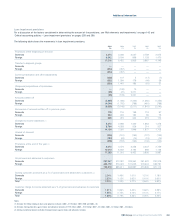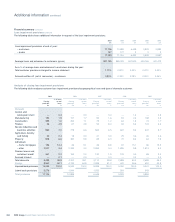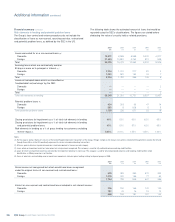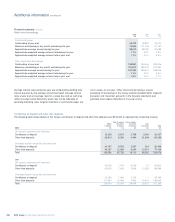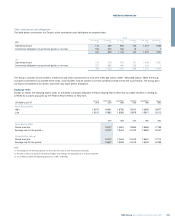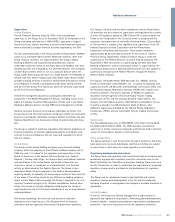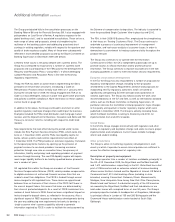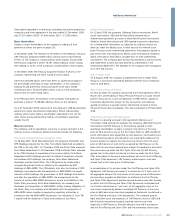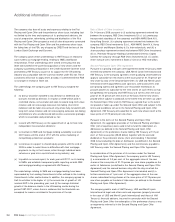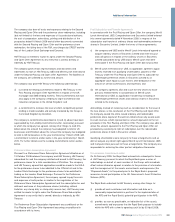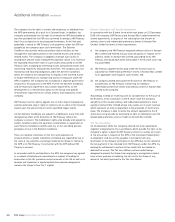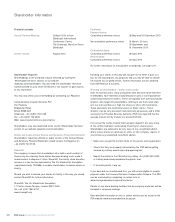RBS 2009 Annual Report Download - page 364
Download and view the complete annual report
Please find page 364 of the 2009 RBS annual report below. You can navigate through the pages in the report by either clicking on the pages listed below, or by using the keyword search tool below to find specific information within the annual report.Additional information continued
RBS Group Annual Report and Accounts 2009362
The Group participated fully in the consultation processes on the
Banking Reform Bill and the Financial Services Bill. It also engaged with
policymakers on Lord Turner’s Review, ‘A regulatory response to the
global banking crisis’, and its associated consultations. These set out a
wide range of ideas and proposals, aimed at strengthening the
resilience of the banking system and addressing perceived short-
comings in existing regulation, notably with respect to the quantum and
quality of bank regulatory capital. Many of these were subsequently
reflected in more detailed proposals issued by the Basel Committee on
Banking Supervision in December 2009 (see below).
Linked to these issues is the policy debate over systemic banks. The
Group has contributed to responses to a number of systemic bank
proposals and is participating in the FSA’s pilot for the development of
Recovery and Resolution Plans (“Living Wills”). It will be developing
suitable Recovery and Resolution Plans in line with forthcoming
regulatory requirements.
Finally, the FSA has taken an active lead in implementing the G20’s
principles on remuneration structures, introducing a Code on
Remuneration Practices which formally took effect on 1 January 2010.
During the second half of 2009, the Group engaged with FSA on its
Code as it was developed, and put in place new governance processes
and policies to deliver compliance. More information on these aspects
can be found on page 225.
In addition to the above, the Group continued to comment on other
specific regulatory and legal changes that could impact its business.
Examples included the FSA’s retail distribution and mortgage market
reviews; and the Department for Business, Innovation and Skills and HM
Treasury’s consumer reforms, including with respect to credit card
markets.
New requirements that took effect during the period under review
include the EU’s Payment Services Directive (PSD), which came into
force on 1 November 2009, and the FSA’s new liquidity regime for
banks, whose systems and controls requirements took effect on
1 December 2009. The PSD provides an extensive regulatory framework
for European payments markets, by opening up the provision of
payment services to non-bank providers; increasing consumer
protection through new rules on execution times, transparency of
information, liability and pricing; and regulating providers of payment
services through licensing. The new FSA liquidity regime will require
much larger liquidity buffers to be held by specified banks, phased in
over a number of years.
UK regulated firms within the Group are members of the Financial
Services Compensation Scheme (FSCS), which provides compensation
to eligible customers of authorised financial services firms that are
unable to meet their obligations. The FSCS is funded through annual
levies charged to UK regulated firms. These levies are apportioned
between firms on the basis of their shares of the FSCS tariff base: in
the case of deposit takers, this means that levies are determined by
their share of protected deposits. As a result of FSCS involvement in a
number of bank failures in 2008, there has been a significant impact on
levies charged to deposit takers, as reflected in the accounts. Also a
significant aspect of RBS’ response to regulatory developments during
the year was addressing new requirements for banks to develop a
‘single customer view’ systems capability, tailored to generate
information required by FSCS in order to facilitate the early payment by
the Scheme of compensation to depositors. The industry is expected to
have the prescribed Single Customer View in place by end-2010.
The FSA, in their 2009/10 Business Plan, emphasised the strengthening
of their focus on ‘Treating Customers Fairly’. The Group continues to
undertake a process of continuous improvement of management
information, and root cause analysis of customer issues, in order to
demonstrate its commitment to treating customers fairly throughout the
product lifecycle.
The Group also continues to co-operate with the Information
Commissioner’s Office, the UK’s independent public body set up to
promote access to official information and to protect personal
information. The Group continues to improve its processes in line with
changing guidelines in order to meet information security requirements.
European Union/Global developments
In the EU, the Group has also responded to a number of proposals for
regulatory and legislative change, including further proposed
amendments to the Capital Requirements Directive and proposals for
establishing new EU regulatory authorities, which are aimed at
significantly strengthening EU level oversight and coordination of
national supervisors. The Group also follows closely the work (and
recommendations) of the G7 and G20, as well as international standard
setters such as the Basel Committee on Banking Supervision. Of
particular note was the Committee’s initial proposals for major changes
to the quality and quantum of banks’ regulatory capital, which were
published in December 2009. The Group is actively reviewing these,
which the Basel Committee is aiming to finalise by end-2010, for
implementation from end-2012 onwards.
United States
In the US the Group engages constructively with regulators and other
bodies on regulatory and legislative change and seeks to ensure proper
implementation and compliance. Current issues include mortgage
reform and student lending.
Other jurisdictions
The Group is active in monitoring regulatory developments in each
country in which it operates to ensure internal policies are sufficient to
ensure the effective management of regulatory risk.
Description of property and equipment
The Group operates from a number of locations worldwide, principally in
the UK. At 31 December 2009, the Royal Bank and NatWest had 649
and 1,612 retail branches, respectively, in the UK. Ulster Bank has a foot
print of 238 branches and an extensive network of business banking
offices across Northern Ireland and the Republic of Ireland. US Retail &
Commercial had 1,512 retail banking offices (including in-store
branches) covering Connecticut, Delaware, Illinois, Massachusetts,
Michigan, New Hampshire, New Jersey, New York, Ohio, Pennsylvania,
Rhode Island and Vermont. A substantial majority of the UK branches
are owned by the Royal Bank, NatWest and their subsidiaries or are
held under leases with unexpired terms of over 50 years. The Group’s
principal properties include its headquarters at Gogarburn, Edinburgh,
its principal offices in London at 135 and 280 Bishopsgate and the
Drummond House administration centre located at South Gyle,
Edinburgh.



